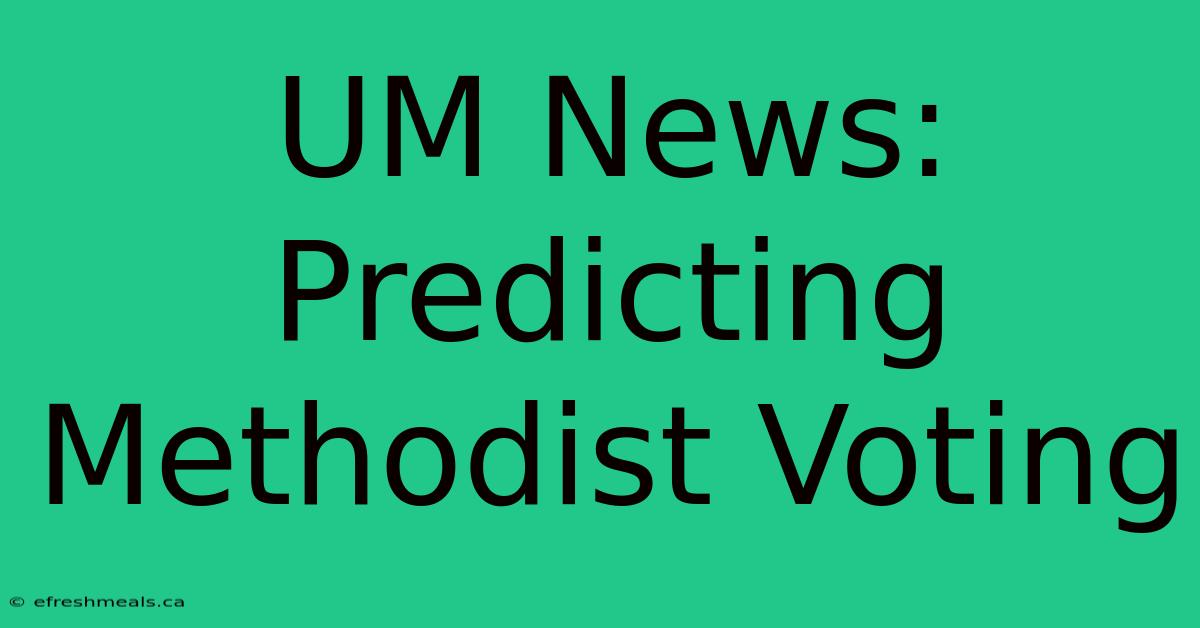UM News: Predicting Methodist Voting

Discover more detailed and exciting information on our website. Click the link below to start your adventure: Visit Best Website nimila.me. Don't miss out!
Table of Contents
Can We Predict How Methodists Vote? Unpacking the Complexities of Religion and Politics
Editor’s Note: The intersection of religion and politics is always a hot topic, and with the upcoming elections, the question of how Methodists vote is especially pertinent. Can we really predict their voting patterns?
Why It Matters: Understanding the role of religion in political decision-making is crucial for comprehending voting trends and the evolving landscape of American politics. Methodists, as a significant religious group, hold a unique perspective that influences their political choices.
Key Takeaways
| Key Takeaway | Description |
|---|---|
| Diverse Opinions | Methodists, like any religious group, exhibit a spectrum of political viewpoints. |
| Social Issues | Social issues like abortion, same-sex marriage, and healthcare are often central to Methodist voters' decisions. |
| Theological Interpretations | Different interpretations of Methodist teachings can lead to varied political stances. |
| Influence of Local Churches | The influence of local pastors and church communities plays a significant role in shaping political attitudes. |
| Beyond Religion | While religion is influential, factors like education, economic status, and geographical location also impact voting choices. |
UM News: Predicting Methodist Voting
The United Methodist Church (UMC) is a large and diverse denomination, spanning across various political and social landscapes. Generalizing how Methodists vote is challenging, as their political affiliations are influenced by multiple factors.
Theological Perspectives
Methodist teachings emphasize social justice, compassion, and service to others. These values can lead to different interpretations regarding political positions. For instance, some Methodists might prioritize pro-life stances based on their understanding of human life's sanctity, while others might prioritize social justice issues like poverty and healthcare access.
Social Issues and Voting
Social issues often play a pivotal role in Methodist voting decisions. Positions on abortion, same-sex marriage, and healthcare are frequently debated within the UMC, leading to diverse perspectives on these topics.
Local Church Influence
The influence of local pastors and church communities cannot be underestimated. Pastors often address political issues during sermons, influencing their congregations' opinions and voting choices.
The Broader Context
While religious values are important, other factors like education level, economic status, and geographical location also influence voting decisions.
Challenges and Limitations
Predicting how Methodists vote is an intricate task, as their political choices are shaped by a complex interplay of factors. Generalizations can be misleading, and it's crucial to recognize the individual nature of political decision-making.
FAQ: Methodist Voting
Q: Do Methodists vote for a specific political party?
A: No, there is no single political party that Methodists uniformly support. Methodist voters belong to different parties and hold diverse political opinions.
Q: What is the role of the United Methodist Church in politics?
A: The UMC generally avoids endorsing specific political candidates. However, the church may engage in advocacy and social justice initiatives that align with its core values.
Q: How do Methodist teachings influence political views?
**A: ** Methodist teachings on social justice, compassion, and service to others can lead to different political positions depending on individual interpretations.
Q: Are Methodists a monolithic voting bloc?
A: No, Methodists are a diverse group with varied political views.
Q: What are some of the key issues influencing Methodist voters?
A: Key issues often include social justice concerns, healthcare access, abortion, same-sex marriage, and environmental issues.
Tips for Understanding Methodist Voting
- Consider the local context: Examine the political landscape of the region where Methodists reside.
- Look beyond party affiliations: Focus on the specific issues and values driving Methodist voters' decisions.
- Recognize the diversity of perspectives: Understand that not all Methodists hold the same political views.
- Engage in respectful dialogue: Encourage open discussions about political issues while acknowledging the diversity of opinions.
- Keep informed: Stay updated on the latest developments in the UMC and their impact on political discourse.
Summary of Predicting Methodist Voting
Predicting how Methodists vote is a complex task, as their political choices are influenced by multiple factors. Their theological perspectives, social issues, local church influence, and broader societal context all play a role. Recognizing the diversity of opinions and individual factors shaping their political choices is crucial for a more nuanced understanding.
Closing Message: As we navigate the complexities of religion and politics, open communication and an understanding of the multifaceted nature of faith and belief are essential for fostering a more informed and respectful dialogue.

Thank you for visiting our website wich cover about UM News: Predicting Methodist Voting. We hope the information provided has been useful to you. Feel free to contact us if you have any questions or need further assistance. See you next time and dont miss to bookmark.
Featured Posts
-
Sabres Vs Islanders Matchup Preview And Info
Nov 02, 2024
-
St Louis Sullivan Mutual Respect In Nhl
Nov 02, 2024
-
Mariah Carey Ushers In Christmas Season
Nov 02, 2024
-
Taylor Swift Live In Toronto Fans Ready
Nov 02, 2024
-
Harris Blasts Trumps Violent Cheney Speech
Nov 02, 2024
